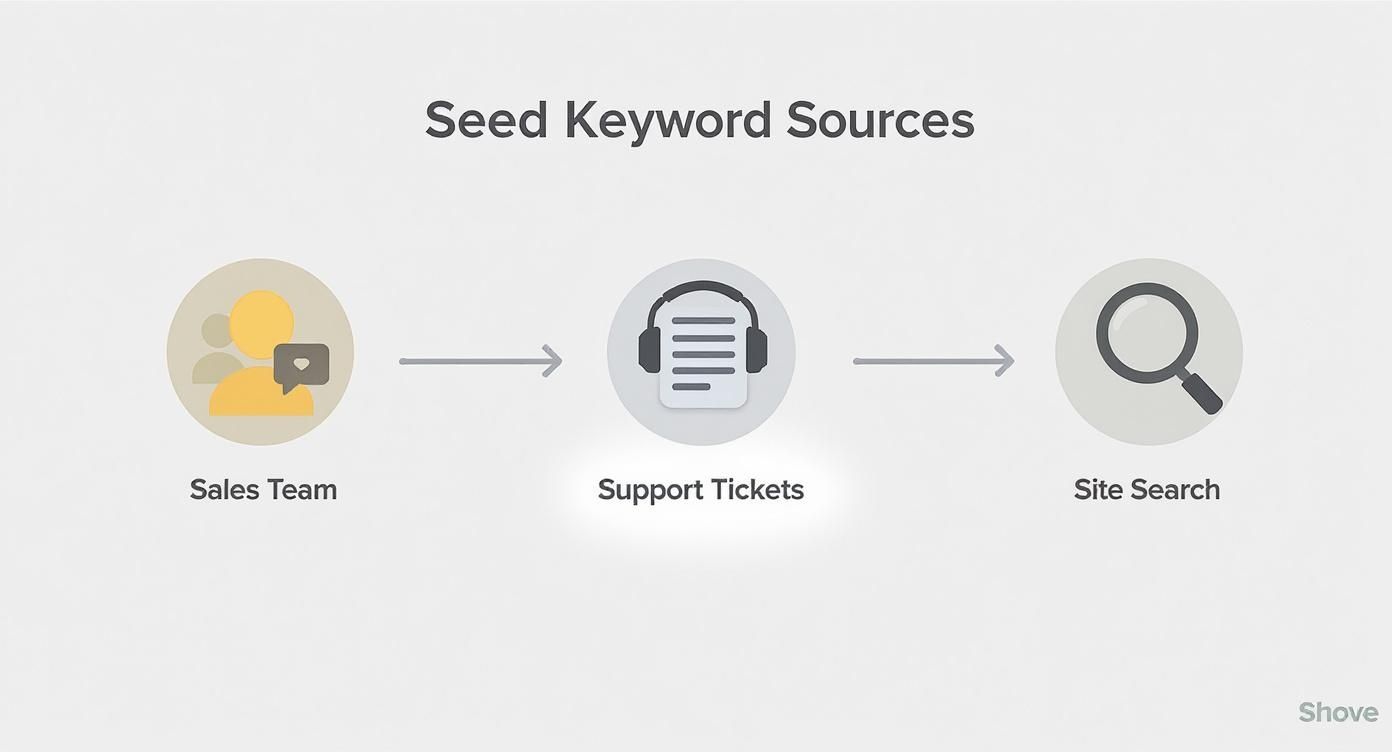How to Find Best Keywords for PPC to Maximize ROI
How to Find Best Keywords for PPC to Maximize ROI
Finding the right keywords for your PPC campaigns isn't rocket science, but it does require a smart process. It all starts with brainstorming your core business terms, using research tools to expand on that foundation, and then zeroing in on the keywords that show real buying search intent while fitting your budget.
This approach is all about making sure your ad dollars are spent on people who are actually looking to buy, not just window shopping.
Why Smart Keyword Research is Non-Negotiable

Diving into a PPC campaign without doing your keyword homework is like trying to find your way through a new city blindfolded. You might stumble upon your destination eventually, but you'll waste a ton of time and cash taking wrong turns.
The right keywords put you directly in front of customers who have their wallets out, ready to go. The wrong ones? They just drain your budget with clicks that lead nowhere.
Think of it as the foundation of your entire ad campaign. A shaky foundation means everything you build on top of it—your ad copy, landing pages, bidding strategy—is likely to crumble. But get the keywords right, and every dollar you spend is set up for the best possible return.
The Core Concepts to Grasp Early
Before we get into the tools and tactics, there are a couple of big ideas you need to get your head around. These concepts separate the campaigns that make money from the ones that lose it.
Search Intent: This is all about the "why" behind someone's search. Are they just gathering info ("how to fix a leaky faucet"), comparing their options ("best plumbers near me"), or are they ready to hire someone right now ("emergency plumber phone number")? You absolutely have to match your keywords to high-purchase intent searches.
Keyword Match Types: These are the rules you set in Google that tell it how closely a search needs to match your keyword for your ad to show up. Nailing this is key to avoiding paying for clicks that have nothing to do with your business.
Getting why smart keyword research is non-negotiable is the first step when you're learning how to select keywords for real business growth. It’s never just about finding a list of terms; it’s about finding the right terms that actually drive results.
Building Your Initial Keyword List from Real Data
Forget guessing. The absolute best way to kick off your PPC keyword research is by starting with real, hard data. We're not looking for a perfect, final list just yet. Right now, the goal is to build a "seed list" of 10-20 core ideas. Think of this as your raw material.
The most powerful insights are usually hiding in plain sight, right inside your own company. Instead of staring at a blank spreadsheet, let's dig into the actual language your customers and internal teams are using every single day.
Uncover Authentic Customer Language
Your customers are constantly telling you what they want. You just have to know where to listen. Tapping into their actual words is the most authentic way to build a keyword list that truly connects.
Customer Support Tickets: Go through recent support emails and chat logs. What specific phrases do people use when they have a problem? These are often long-tail keywords brimming with intent.
On-Site Search Queries: What are visitors typing into your website's search bar? This is a goldmine. It's unfiltered, direct insight into what they hope to find on your site. For an even deeper look, our guide on the Google Ads search terms report shows you what queries are already triggering your ads.
Sales Team Conversations: Your sales team is on the front lines. They hear the questions, objections, and pain points directly from prospects. Ask them for the common phrases they hear—these are often pure, bottom-of-the-funnel gold.
To get a well-rounded list, it's always smart to pull these seed keywords from a few different places. Experienced PPC pros almost always start by looking at three things: monthly search volume, cost-per-click (CPC), and—most importantly—search intent. You can get more great tips on this strategy and discover insights on PPC keyword research from Semrush.
Grounding your initial list in this real-world data ensures your campaign is built on customer language, not just industry jargon. This simple shift can make a massive difference right from the get-go.
Seed Keyword Source Comparison
To give you a better idea of where to look, here's a quick breakdown of the best places to find those initial seed keywords and what makes each one valuable for PPC.
Each source gives you a slightly different angle on your customer's mindset. Combining them gives you a much stronger and more comprehensive starting point for your research.
Let Keyword Tools Do the Heavy Lifting
https://www.youtube.com/embed/Zv3e_sOCEL0
Got your seed list ready? Great. Now it's time to pour some gasoline on that fire.
Your initial list of 10-20 ideas is the perfect starting point, but technology is what will turn it into hundreds, or even thousands, of real opportunities. This is where a good keyword research tool comes in. It’s an absolute must if you want to find the best keywords for your PPC campaigns because it does the grunt work and gives you data you can’t get anywhere else.
Tools like our own Keywordme platform are built for this. You just pop in a term like "eco-friendly water bottle," and it’ll spit back a huge list of related long-tail keywords, customer questions, and even terms your competitors are bidding on.
But this isn't just about getting a bigger list. It's about getting a smarter list.
Focus on the PPC Metrics That Actually Matter
I see a lot of people get hung up on search volume. While it's a nice-to-know metric, for PPC, it’s not the main event. You need to look at the data that directly affects your wallet and your bottom line. The right tool helps you cut through the noise and spot the keywords worth paying for.
Here are the metrics I always zero in on:
- Estimated Cost-Per-Click (CPC): This gives you a ballpark of what each click will cost. Don't be scared by a high CPC—it's often a dead giveaway that a keyword has strong buying intent.
- Competition Level: This metric shows you how many other advertisers are fighting for that same keyword. High competition usually means it’s valuable, but you’ll have to bid more aggressively to get seen.
- Commercial Intent: Keep an eye out for keywords with transactional modifiers like "buy," "for sale," or "pricing." When someone types that in, they’re not just browsing—they have their credit card out.
It all starts by plugging in the real-world terms you already found.

As you can see, your best ideas come straight from talking to your customers and internal teams. That foundation is what makes your keyword tool so much more powerful.
Turning Data Into Action
Armed with this data, you can finally start making some smart, strategic decisions. The confidence in paid search is sky-high for a reason. In the U.S. alone, spending hit an estimated $124.59 billion, which was an 11.1% jump from the previous year. While the average CPC on Google Ads hovers around $1.16, that number can swing wildly depending on your industry. If you're curious, you can see how your industry stacks up with these PPC statistics from Backlinko.
The goal isn't to find every keyword under the sun. It's to find the right keywords—the ones with a clear path to conversion—so you can put your budget where it will make a real difference.
To make the process even smoother, check out our guide on the best PPC keyword research tools to find one that fits your style. These platforms are essential for filtering, sorting, and turning a messy spreadsheet into a beautifully structured campaign.
Getting Inside Your Customer's Head: Decoding Search Intent

So you've got a giant list of keywords. That's a great start, but it's only half the game. The real trick, the thing that separates the pros from the rookies, is getting a handle on search intent.
What is search intent? It’s simply the why behind what someone types into that search bar.
You can find a keyword with insane search volume, but if the searcher’s goal doesn't match what you’re selling, you're just throwing money away on clicks that go nowhere. Nailing the intent is how you find keywords that actually lead to sales.
The Four Flavors of Search Intent
To really get this right, you need to think about your keywords in four main buckets. Each one tells you something different about where the searcher is in their buying journey.
Informational: People are just looking for answers. Think "how to fix a leaky faucet" or "what are the best running shoes." These are usually terrible for direct sales ads because the person is in learning mode, not buying mode.
Navigational: The searcher already knows where they want to go. They’re just using Google as a shortcut. For instance, "Keywordme blog" or "Facebook login." The only time you'd bid on these is for your own brand name to fend off competitors.
Commercial: Now we're getting warmer. The person is actively researching and comparing options. Keywords like "best emergency plumber reviews" or "Keywordme vs Semrush" fit right in here. They're close to making a decision, but not quite there yet.
Transactional: This is the jackpot. The user has their credit card out and is ready to buy now. They're searching for things like "plumber near me," "buy running shoes online," or "emergency faucet repair."
Focusing your ad budget on transactional and high-commercial intent keywords is absolutely key. It makes sense when you realize that PPC visitors are 50% more likely to purchase than organic visitors—a stat that proves just how powerful it is to catch someone at the right moment. If you want to dive deeper, you can check out more PPC statistics that really drive this point home.
Key Takeaway: You absolutely have to match your ad copy and landing page to the searcher's intent. If someone searches "emergency plumber," they need a big phone number and a promise of a quick fix, not a blog post about the history of faucet maintenance.
Structuring Keywords for Campaign Success

You can have the most brilliant keyword list on the planet, but it’ll fall flat without a solid structure. This is where your research meets reality, turning a raw list of terms into a high-performing campaign that Google’s algorithm will actually reward.
The core idea is all about tight, logical grouping. Every keyword in an ad group should be closely related. This isn't just about being tidy—it's a move that directly impacts your campaign's most important metrics, from click-through rates to your bottom-line costs.
Embrace Single Theme Ad Groups
This brings us to the magic of Single Theme Ad Groups (STAGs). A STAG is exactly what it sounds like: an ad group built around one single, specific theme. You’re only using a small handful of keywords, maybe 5-20 at the most, that all share the exact same user intent.
Let’s say you’re selling water bottles. You wouldn't just throw "eco-friendly water bottle" and "stainless steel gym bottle" into the same bucket. That’s a classic rookie mistake.
Instead, you'd create two separate, laser-focused ad groups.
eco-friendly water bottlesustainable water bottlebuy recycled water bottle
stainless steel gym bottlebest water bottle for gymdurable gym water bottle
See how specific that is? This tight structure lets you write hyper-relevant ad copy that speaks directly to what the user is searching for. Someone looking for a "gym bottle" sees an ad that talks about durability and performance, not just eco-friendliness. That perfect match is what gets people to click.
This level of relevance is exactly what Google’s Quality Score algorithm is built to reward. When you give users a better, more relevant experience, Google often gives you lower costs-per-click (CPCs) and better ad positions. It’s a win-win.
Don't Forget the Final Touches
Getting the structure right involves a couple more critical pieces. First up is the smart use of keyword match types. Use Exact Match for your money-making, high-intent keywords to keep a tight rein on your budget. Then, you can use Phrase or Broad Match in separate ad groups or campaigns to explore and discover new search queries.
Finally, a strong negative keyword list is absolutely essential. This is your defense against wasting money on irrelevant searches. Learning how to properly find negative keywords is a foundational PPC skill that will save you a fortune over time by stopping those budget-draining clicks before they ever happen.
Got Questions About PPC Keywords? Let's Dig In.
Even with the best strategy, some questions always come up when you're in the trenches of keyword research. Let's tackle a few of the most common ones I hear from clients and colleagues. Getting these right can be the difference between a campaign that just runs and one that truly sings.
How Often Should I Be Doing Keyword Research?
Look, keyword research isn't a "set it and forget it" task. For any campaign you're actively running, you should be rolling up your sleeves and diving into your search term reports at least once a month.
In really competitive or fast-moving industries, I'd even recommend a quick check-in weekly. This keeps you on top of new search trends, lets you see what your competitors are bidding on, and helps you pivot quickly when customer behavior shifts. It happens faster than you think.
Think of it as ongoing maintenance for your campaigns. It’s a continuous cycle of discovery and refinement, not just a one-off task you complete at launch.
This constant process of researching, analyzing, and tweaking is what really separates the good campaigns from the great ones.
What's the Magic Number of Keywords for an Ad Group?
When you're building out ad groups, remember this: tighter is better. The whole point is to group keywords that share the exact same user intent.
For a really solid campaign structure, especially if you're using the Single Theme Ad Group (STAG) model, you're aiming for a sweet spot of about 5-20 keywords per ad group. And they have to be super similar.
This tight focus is your secret weapon. It allows you to write incredibly relevant ad copy that speaks directly to the searcher's query. If you're looking at a keyword and it feels even a little bit different from the others, that's your sign. Don't shove it in; create a new ad group for it.
Should I Really Bid on My Own Brand Name?
Yes. Absolutely, yes. I get this question all the time, and for most businesses, bidding on your brand name is a non-negotiable defensive play.
Think about it: if you don't, you're leaving the top spot wide open for a competitor to place an ad right above your organic result. They can literally steal clicks from people who were already looking for you.
Besides, branded campaigns are usually cheap to run because your quality scores will be through the roof. They deliver high click-through rates and strong conversions, giving you full control over the message and the user experience for your most loyal audience. It's a no-brainer.
Ready to stop juggling spreadsheets and start optimizing your Google Ads campaigns up to ten times faster? Keywordme brings all your essential PPC keyword tasks into one simple, powerful platform. Clean up junk terms, find high-converting keywords, and stop wasting ad spend with our intuitive tool. Start your free 7-day trial of Keywordme today!


.svg)